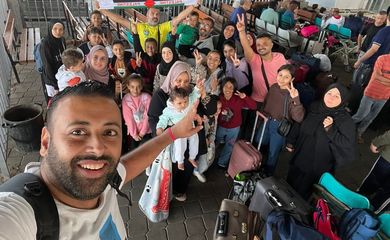Foreign Minister celebrates repatriation of Brazilians from Gaza

Brazil's Foreign Minister, Mauro Vieira, on Sunday (Nov. 12), celebrated the departure of the group of 32 Brazilians and their Palestinian relatives who were awaiting repatriation in the Gaza Strip, an enclave controlled by the Palestinian group Hamas.

He stressed that the situation in the conflict between Israel and Hamas is "extremely serious" and that President Luiz Inácio Lula da Silva remains involved in the search for a peaceful solution in the region.
According to Vieira, President Lula has maintained ongoing discussions with the United Nations Secretary General, António Guterres, as well as with heads of state in the region—including Egypt, Israel, and Qatar—alongside other key stakeholders involved in the conflict in the Middle East.
"The immediate situation of these Brazilians has been resolved, but the broader conflict remains highly serious, and President Lula continues to actively engage in finding a resolution," stated the foreign minister during a press conference.
"President Lula intends to readdress the matter at the United Nations Security Council starting this week, seeking avenues to halt hostilities…and initiate a humanitarian pause to bring relief to the Palestinian civilian population in Gaza," Vieira added.
Repatriation
The minister reported the departure of the group of 32 individuals from Gaza "with great satisfaction." "They were the focus of our concern and continuous efforts to secure a negotiated exit as soon as possible," he expressed, extending gratitude to the diplomatic corps of the Ministry of Foreign Affairs for their dedicated work and recalling the commitment of President Lula's government to the success of the mission.
"It's a region at war, the circumstances are complex and difficult. There were agreements in the region which established that first, every day, before the passage for civilians was opened, ambulances would need to leave with the wounded. On the days when it wasn't possible for the ambulances to leave, no one crossed at the starting point [Rafah Gate]," said Vieira.
The minister explained that Brazilian diplomacy relied on the goodwill of both Israel and Egypt to solve the problem of the Brazilians leaving: "If it didn't happen before, it wasn't just with Brazil, it was with all the other countries. There was a list of countries and their nationals who were ready, waiting to leave, some countries had 500, 600 nationals, our list was much smaller. As the lists were received, they were placed in an order of priority that was followed and complied with," he commented.



